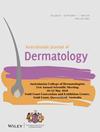A Guide to Screening for Autoimmune Diseases in Patients With Vulvar Lichen Sclerosus
Abstract
Background
The aetiology of vulvar lichen sclerosus (VLS) remains unknown. However, there is evidence that in addition to a genetic predisposition, autoimmunity contributes to the pathogenesis.
Objectives
The objective of this study was to determine the prevalence of autoimmune disease and positive autoantibody serology in patients with VLS.
Methods
A VLS database in Sydney, Australia, was retrospectively reviewed. A diagnosis of VLS was required for inclusion in the study. Data collected included demographics, comorbidities including any personal history of autoimmune disease, family history of autoimmune disease, and the results from autoantibody testing. A total of 2243 females with VLS were included in this study.
Results
Autoimmune disease was found in 24.5% and 34.6% of children and adults with VLS, respectively. The most prevalent autoimmune conditions were psoriasis, Hashimoto's thyroiditis, lichen planus, and vitiligo. Antinuclear antibodies were common and found in 31.0% of patients. Thyroid peroxidase and thyroglobulin antibodies were present in 16.1% and 18.9% of cases, respectively. Thyroid function, determined by thyroid stimulating hormone, was abnormal in 8.2% of patients. 5.3% of patients had positive parietal cell antibodies, and 5.9% had low vitamin B12 levels.
Conclusions
This work provides support that VLS is of an autoimmune aetiology, and that there is an association between VLS and autoimmune diseases. The high proportion of patients with an abnormal thyroid test, positive thyroid antibodies, and intrinsic factor and gastric parietal cell antibodies with low vitamin B12 levels, warrants screening for thyroid disease and pernicious anaemia in patients with VLS. Initial autoimmune screening in VLS can be rationalised to TSH, vitamin B12 levels, intrinsic factor and parietal cell antibodies. Thyroid antibodiy testing shouls be performed in hypothyroid patients.

 求助内容:
求助内容: 应助结果提醒方式:
应助结果提醒方式:


